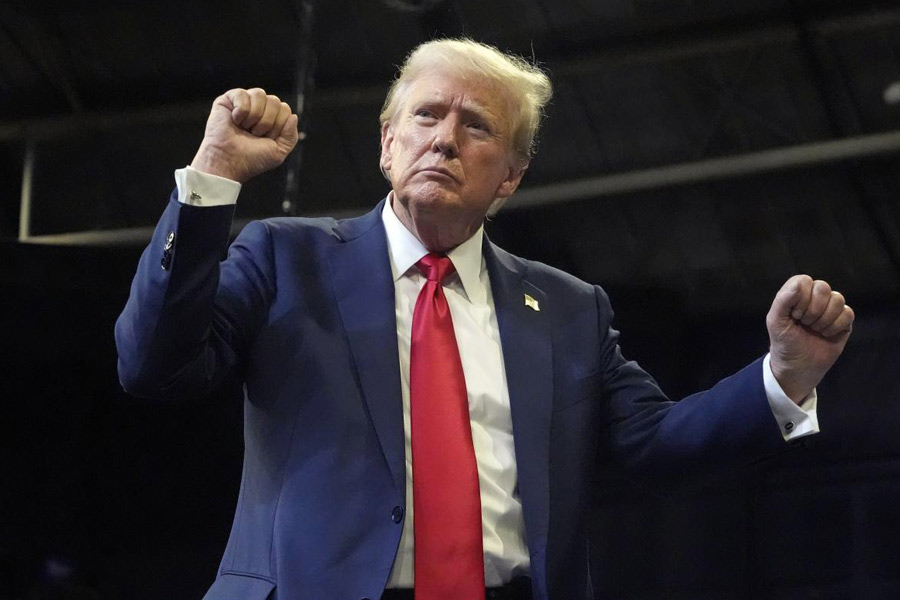Donald J. Trump’s golf club in Jupiter, Florida, where multi-million-dollar villas flank the greens of an 18-hole course, reflects the new geography of his family business. Long based in New York, the Trump Organization has gravitated recently to Florida’s southeast coast, where its golf and resort properties now pay the bills.
A decade ago, before Trump ran for president for the first time as a Republican in 2016, his golf courses and resorts were a drain on the company's cash flow, which mostly came from real estate, according to a Reuters analysis of court and tax records and other financial disclosures.
But today, the golf and resort business is the biggest driver of the company’s cash flow — accounting for about four-fifths of the approximately $80 million in cash after operating expenses that will be generated this year by the hundreds of companies ultimately owned by Donald Trump, known collectively as the Trump Organization. The group’s annual revenues are over $600 million, according to the Reuters estimate.
The analysis is the first detailed estimate of Trump’s projected 2024 income, as he contests November’s presidential election. It is based on financial statements and other information provided as part of court cases, regulatory filings by Trump Organization entities and their partners, U.S. tax records and other documents.
The health of Trump’s golf business is a bright spot at a precarious moment for the Trump Organization: it faces more than $530 million of court judgments and interest against Trump, some family members who hold senior roles, and his companies; a weak commercial real estate market in New York; and the question of what happens if Trump loses a tight race for the presidency.
If enforced, the court judgments would exceed the amount of cash that Trump said he had as of this March, via a social media post: “almost five hundred million dollars.”
Reuters shared its detailed projections with former president Trump’s son Eric who runs the family business, and two other senior Trump Organization executives, and Trump’s campaign representatives.
“The Trump Organization is the strongest it has ever been,” Eric Trump said in a written response. “We have the best and most iconic assets anywhere in the world and I am incredibly proud of not only everything the company has accomplished, but also everything my father has accomplished in the political world."
He did not comment directly on the financial estimates or other specifics shared by Reuters, and the others did not respond.
The news agency also interviewed more than a dozen business associates, real estate and leisure industry experts, and people familiar with Trump properties.
On paper, much of Trump's wealth is tied up in his majority stake in Trump Media & Technology Group, owner of social media platform Truth Social. Shares of the media company have been pumped sky-high in large part by retail investors enthusiastic about Trump’s brand and his prospects in November’s election.
After surging early this year, stock has fallen by more than half, but the company – in which Trump holds a stake of more than 50% - still has a market capitalization of about $4.5 billion. As of Monday, that stake was worth about $2.5 billion
The media company, however, adds nothing to Trump’s cash flows – it is a separate company from the Trump Organization and it generated a loss of $58 million last year on revenues of just $4 million. His shares in Trump Media are locked up by a corporate agreement that expires in September. If faced with a large legal bill after that, Trump could unload those shares piecemeal – selling all at once could cause the stock to tank – or sell off assets like buildings.
JEWEL IN THE CROWN
Last week Trump submitted his latest U.S. Office of Government Ethics candidate financial disclosure. This included the revenues from some of his businesses and fees received for endorsements, such as a $300,000 fee for promoting a bible published by a country singer. The disclosure consists mostly of broad ranges of value Trump has ascribed to his businesses and ranges of revenues that these businesses generated across 2023 and part of 2024, rather than estimates of the cash he earns.
The jewel in the crown of Trump’s business is the Mar-a-Lago Club in Palm Beach, the ornate resort where the former President lives and receives a stream of politicians and influence-seekers: that will generate an estimated $24 million in cash in 2024, according to the Reuters analysis.
Three nearby golf-focused properties are also resurgent, with revenue jumping in the wake of the Covid pandemic. Trump National Doral, the expansive but leveraged Miami-area golf hub, will generate an estimated $10.5 million cash, while smaller clubs in Jupiter and West Palm Beach will yield an estimated $8.4 million and $10.4 million, respectively, according to the Reuters estimates.
The rise in golf-related cashflow underlines Trump’s popularity with a core of affluent Americans, especially in strongholds of his Make America Great Again movement like Florida.
Trump “has galvanized people who are his base to come spend their money at his places because they want a piece of him,” said Christopher Henry, CEO of consultants Majestic Hospitality Group.
Reuters based its analysis on the clubs’ past profitability, as disclosed in court documents, adjusted for the increased revenues predicted by the Trump Organization and checked against Trump’s most recent Office of Government Ethics disclosures.
Reuters’ estimates exclude major capital expenditure on upgrades to the Trump properties, which can be significant, said Doug McCoy, a professor of finance at Indiana University. While the news agency found no public reports of such renovations, that could mean the Reuters cash flow estimate is too high.
Florida-based golf consultant Stephen Eisenberg said major course renovations are required every 10 to 15 years.
In addition to McCoy, Reuters vetted its analysis with three independent experts in the real estate and resort industries – an investment bank analyst, a finance professor and an industry executive. None of them took issue with the overall approach or underlying calculations.
Golf course owner and consultant Kenny Nairn said some in the industry are bracing for a possible cooling in the Florida market after a heady few years. More than a dozen new golf courses are being built in the state, which will increase competition for members and playing fees.
Trump’s Florida courses had margins of over 30% across 2021, 2022 and the first five months of 2023, according to documents released as part of the fraud trial.
“Most clubs here in Florida are in the 8% to 10% NOI (net operating income). If you have a fantastic year, you can be up to 15%, 17%,” Nairn said, adding that he could not see those profit margins being sustained.
LEGAL TROUBLES IN NEW YORK
In 2022, New York’s attorney general brought a fraud case against the Trumps for overstating the valuation of their properties for economic gain. The prosecution was successful: a judge in February fined the former president, his companies, and two eldest sons $363 million. Including interest, the fine stands at more than $450 million.
The ruling temporarily barred Donald, Eric and Donald Jr. from serving as an officer or director of a New York-based company, and mandated an independent monitor and director of compliance, citing the fraud conviction and inadequate internal controls.
Trump has posted a $175 million bond while the case is on appeal and Eric Trump remains in charge of the Trump Organization. There is also an $83.3 million defamation verdict against Trump as a private defendant, which is also being appealed.
Days after the valuation judgment in New York, the Trump Organization said it had shifted a series of legal entities foundational to its business from Manhattan to Florida, including to the address of its Jupiter golf club. The reorganization, though, appears to have been blocked by the judge, who ruled Trump could not evade the terms of its monitorship through “change in corporate form.” Eric Trump and the Trump Organization did not comment on this.
The Manhattan Supreme Court judge, Arthur Engoron, did not respond to an email seeking comment. The New York attorney general’s office declined to comment.
Florida has been friendlier. In March, the state’s Republican attorney general joined a legal brief supporting the former president before the U.S. Supreme Court; it called the New York case against Trump a “shocking” and partisan attempt to bankrupt him. The Florida attorney general’s office did not respond to a request for comment.
NEW EXPANSION, OLD DEBTS
Reinforcing the growing importance of Florida, the Trump Organization is seeking approval from the city of Doral, just outside Miami, to build nearly 1,500 residential units at his golf resort there. It would be the group’s first major new property development since completing a set of condominium-hotel towers in Las Vegas and Chicago in 2008 and 2009, respectively.
In New York, however, a cooling of the commercial property market poses a problem for the Trump Organization.
Coming due in 2025 is Trump’s approximately $120 million loan on 40 Wall Street – an office skyscraper in Manhattan where occupancy and income have declined. The building was one-fifth empty at the end of last year, according to Fitch Ratings.
Falling rents and a sharp rise in interest rates mean that buildings like 40 Wall Street are typically unable to generate the revenues to service the high levels of debt they did during the commercial property boom before the pandemic, according to Stijn Van Nieuwerburgh, a professor of real estate and finance at Columbia University.
The Trump Organization for now is building its business from Jupiter, the wealthy beach town known for golf courses and big-name residents nearby, such as Michael Jordan and Tiger Woods.
Eric and Donald Jr. both live in town with their families and work a short ride away at Trump National Golf Club Jupiter. It’s there that they applied for permits earlier this year to build a three-story, nearly 46,000 square foot headquarters for what company literature refers to as the “Trump Golf empire.”
In February, Eric Trump went on Fox News from Florida to decry the valuation fraud ruling against the family business as politically motivated.
“The best thing I ever did,” he said, “was get out of New York.”











